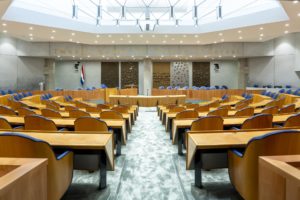Zzp debate puts relations on edge: House divided over future VBAR and alternative proposal by VVD, D66, CDA and SGP
The political landscape surrounding the ZZP dossier is in full swing following the ZZP Committee debate on Thursday, April 3. Last week, the Parliamentary Committee on Social Affairs and Employment held a debate with Ministers Van Hijum (SZW) and Van Oostenbruggen (Taxation and Fiscal Service). The focus was on the progress of the much discussed and heavily criticized bill Verduidelijking Beoordeling Arbeidsrelaties en Rechtsvermoeden (VBAR). On March 27, Minister Van Hijum sent another parliamentary letter to the House of Representatives, in which he announced that he would amend the bill following the important ruling by the Supreme Court in the FNV/Uber case. This ruling led to external entrepreneurship being equated with employeehood and self-employment within the employment relationship.
MPs still critical of VBAR adjustment
During the debate, it became clear that several MPs still have strong reservations about the VBAR. The criticism mainly focuses on the fact that the proposed adjustments seem to be merely "codification of court decisions," which, according to several groups, is insufficient to effectively address false self-employment. For example, Rikkers-Oosterkamp (BBB) called the VBAR bill as "shooting with hail at a gnat," and MP Flach (SGP) once again called attention to breaking up the bill, since there is a lot of support and backing for the legal presumption of employment below a certain hourly rate.
Alternative proposal Aartsen (VVD): Belgian model as inspiration
VVD MP Aartsen used the debate to draw emphatic attention to his initiative bill, which is inspired by laws and regulations in Belgium. The proposal was published on Thursday morning, just a few hours before the zzp-debate. The essence of this proposal is that there will be more clarity in advance whether one is self-employed or an employee. There will also be more focus on the position of the self-employed person themselves, rather than criteria and elements within the employment relationship. This will provide clarity in advance and prevent false self-employment, according to Thierry Aartsen.
The parties D66, CDA and SGP support Thierry Aartsen's initiative. MP Vijlbrief (D66) emphasized during the debate that the proposal finally offers a clear legal approach to the problems that have existed for more than 15 years around self-employment and false self-employment.
NSC and PVV critical: agreements mainline agreement important
Yet Aartsen's proposal did not receive only positive reactions. The NSC and PVV, in particular, were decidedly critical, particularly because they feel that the proposal is not in line with the agreements previously made in the Framework Agreement. Indeed, the Outline Agreement states that work on the VBAR bill will continue.
MP Boon (PVV) was therefore critical of Aartsen: "I am shocked at how easily Aartsen steps over previously made agreements." MP Saris (NSC) also indicated that "a deal is a deal" and that NSC is sticking to the agreements in the Framework Agreement. This immediately made it clear that support from coalition partners NSC and PVV for Aartsen's proposal is not self-evident.

Recovery and Resilience Plan puts additional pressure on tackling false self-employment
It was also made clear during the debate that the Netherlands has agreements in place with the EU through the 2022 Recovery and Resilience Plan, which explicitly addresses tackling false self-employment. DENK MP Ergin asked explicitly whether the VBAR is mentioned by name in this plan, or whether alternatives such as Aartsen's proposal could possibly also meet the Brussels conditions. Minister Van Hijum indicated that he is looking into this, but at the same time stressed that changes to the agreements with the European Commission are limited. This ultimately involves €600 million.
Initial reactions from civil society
The Vereniging Zelfstandigen Nederland (VZN) responded critically to the debate. According to VZN, the problem with the VBAR remains that it mainly focuses on "repair" and codification, without actually offering a structural solution to the underlying problem of false self-employment. VZN stresses the importance of a clear and transparent assessment framework in which self-employed workers are given advance certainty. In that light, Aartsen's Belgian model appeals to them, but VZN also emphasizes that broader political consensus is necessary to truly reach a sustainable solution.
The coalition of industry associations, consisting of the ABU, NBBU, Bovib, VvDN and RIM, also remains critical of the VBAR. They have expressed that the VBAR is redundant after the Uber ruling and are calling for the legal presumption of employment to be implemented quickly and to actually get to work on social security reform.
Political relationships: PVV highly critical
The political dynamics surrounding this dossier are extremely fascinating. Currently, the proposal by VVD, D66, CDA and SGP can count on 41 seats in the Lower House. This is a solid base, but still insufficient for a parliamentary majority. The BBB is extremely critical of the VBAR and there is a good chance that this party will eventually support Aartsen's proposal as well. In turn, this will also have major implications for relations in the Senate, where the BBB has a solid position with 16 seats.
The coming period will reveal whether there will finally be a broad-based solution to the problem of false self-employment that has persisted for years. One thing is certain: political divisions remain and it will be a challenge to balance the two proposals.
Request a free consultation

Questions about this? Please contact us.
Sem Overduin
Public Policy & Affairs Manager
Sem.Overduin@headfirst.nl
Oifik Youssefi
Public Affairs Officer
Oifik.Youssefi@headfirst.nl
Maaike van Driel
Head of Legal
Maaike.vanDriel@headfirst.group
Thomas ten Veldhuijs
Senior Legal Counsel
Thomas.tenVeldhuijs@headfirst.nl
